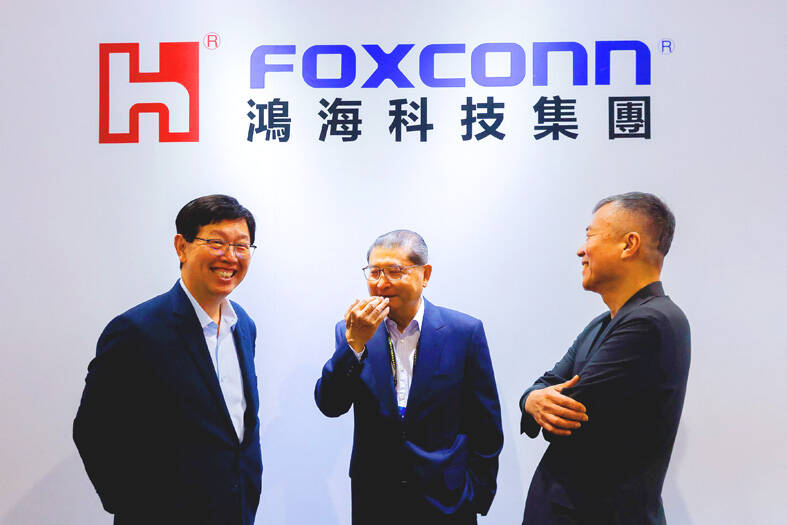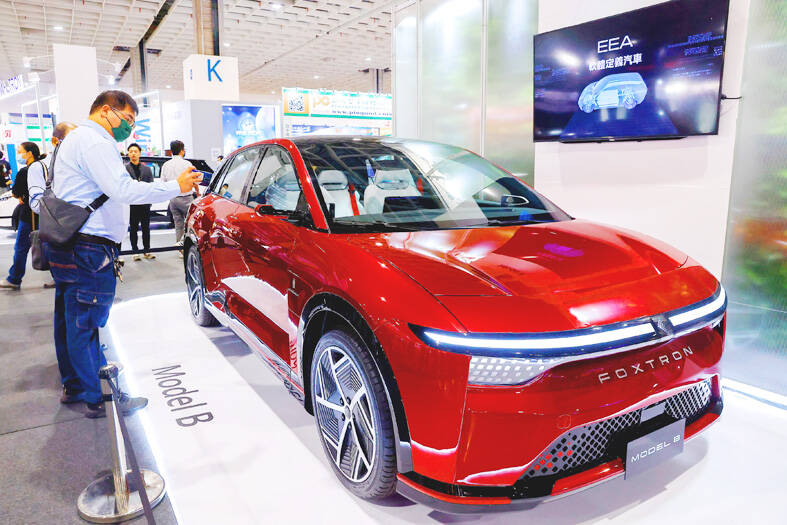The MIH Consortium, an electric vehicle (EV) alliance led by Taiwan-based manufacturing giant Hon Hai Precision Industry Co (鴻海精密), plans to introduce its first commercial electric vehicle prototype in October, it said on Wednesday.
Work on the A-segment Project X demonstration EV is progressing well, MIH CEO Jack Cheng (鄭顯聰) said in an interview at the Taipei International Automobile Electronics Show.
The three-seat EV is likely to be completed in October and begin mass production in 2025, he said.

Photo: Ann Wang, Reuters
The consortium also plans to unveil concepts for a six-seat version of the vehicle next year and a nine-seater in 2025, Cheng said.
MIH plans to focus the vehicle’s promotion on transportation and logistics companies, he said.
MIH had said earlier that the three-seat Project X vehicle would retail at under US$20,000, while buyers would be able to choose from a wide range of customization options via the MIH “build your own vehicle” model.

Photo: Ann Wang, Reuters
MIH has been working with Hon Hai and Thailand’s PTT PCL to extend the consortium’s supply chain into Thailand, where it plans to set up a technological innovation center, Cheng said.
Created to serve the MIH EV open platform, the MIH consortium became operational in July 2021 as part of Hon Hai’s efforts to enter the EV market and diversify from contract manufacturing into hardware and software capabilities.
The open platform was initiated by Hua-chuang Automobile Information Technical Center Co (華創車電), a subsidiary of Taiwan’s Yulon Motor Co (裕隆), and aims to become what executives called “the Android of the EV industry.”
The MIH alliance has 2,621 members in 69 countries and regions around the world.

TAKING STOCK: A Taiwanese cookware firm in Vietnam urged customers to assess inventory or place orders early so shipments can reach the US while tariffs are paused Taiwanese businesses in Vietnam are exploring alternatives after the White House imposed a 46 percent import duty on Vietnamese goods, following US President Donald Trump’s announcement of “reciprocal” tariffs on the US’ trading partners. Lo Shih-liang (羅世良), chairman of Brico Industry Co (裕茂工業), a Taiwanese company that manufactures cast iron cookware and stove components in Vietnam, said that more than 40 percent of his business was tied to the US market, describing the constant US policy shifts as an emotional roller coaster. “I work during the day and stay up all night watching the news. I’ve been following US news until 3am

Six years ago, LVMH’s billionaire CEO Bernard Arnault and US President Donald Trump cut the blue ribbon on a factory in rural Texas that would make designer handbags for Louis Vuitton, one of the world’s best-known luxury brands. However, since the high-profile opening, the factory has faced a host of problems limiting production, 11 former Louis Vuitton employees said. The site has consistently ranked among the worst-performing for Louis Vuitton globally, “significantly” underperforming other facilities, said three former Louis Vuitton workers and a senior industry source, who cited internal rankings shared with staff. The plant’s problems — which have not

UNCERTAINTY: Innolux activated a stringent supply chain management mechanism, as it did during the COVID-19 pandemic, to ensure optimal inventory levels for customers Flat-panel display makers AUO Corp (友達) and Innolux Corp (群創) yesterday said that about 12 to 20 percent of their display business is at risk of potential US tariffs and that they would relocate production or shipment destinations to mitigate the levies’ effects. US tariffs would have a direct impact of US$200 million on AUO’s revenue, company chairman Paul Peng (彭雙浪) told reporters on the sidelines of the Touch Taiwan trade show in Taipei yesterday. That would make up about 12 percent of the company’s overall revenue. To cope with the tariff uncertainty, AUO plans to allocate its production to manufacturing facilities in

TARIFF CONCERNS: The chipmaker cited global uncertainty from US tariffs and a weakening economic outlook, but said its Singapore expansion remains on track Vanguard International Semiconductor Corp (世界先進), a foundry service provider specializing in producing power management and display driver chips, yesterday withdrew its full-year revenue projection of moderate growth for this year, as escalating US tariff tensions raised uncertainty and concern about a potential economic recession. The Hsinchu-based chipmaker in February said revenues this year would grow mildly from last year based on improving supply chain inventory levels and market demand. At the time, it also anticipated gradual quarter revenue growth. However, the US’ sweeping tariff policy has upended the industry’s supply chains and weakened economic prospects for the world economy, it said. “Now